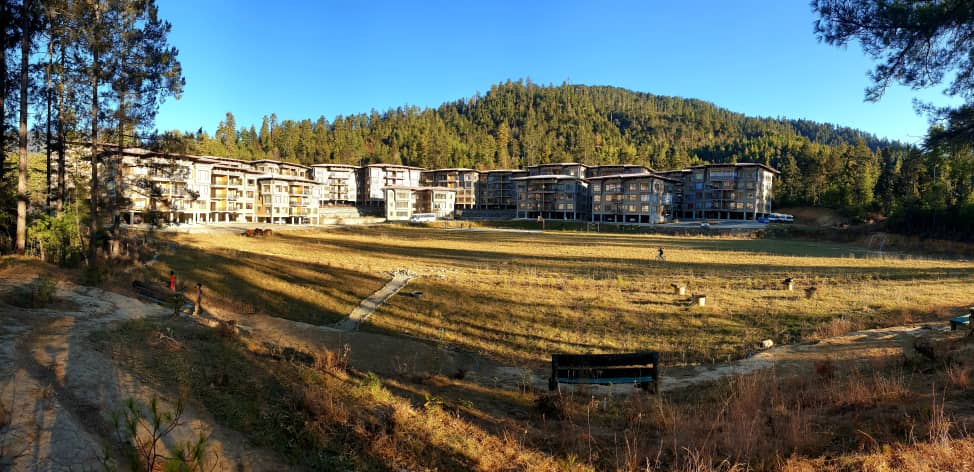Sesiri Pathirane is a tech investor and entrepreneur who has been highly instrumental in – with blessings of the Government & cooperation from Private sector investors – revolutionizing the digital landscape in Bhutan in a bid to position the country as a digital hub in the South Asian region. As a result, the country’s first Private sector-funded tech park, The Bhutan Education & Technology Academy Park (BETA Park), will be launched officially mid-January 2021 facilitating an ecosystem where digital/technological entrepreneurship could thrive. The BETA Park which is dubbed Bhutan’s Silicon Valley has been designed featuring a host of amenities including inspiring co-working spaces & a fully-fledged academic institution, London Institute of Business and Technology Campus (LIBT), which Pathirane happens to be Chairman/CEO of. Following are excerpts of the interview:
Q: Could you describe what the envisioned ‘Digital Transformation’ in the context of Bhutan entails?
A: There are three pillars for digital transformation: People, process & technologies; without preparing the ‘people’ factor, none of the other measures taken will transpire to expectation. What we have also realized is, after the Covid19 pandemic, people who weren’t ready to embrace the digital struggled & were gravely disadvantaged compared to those who were more adaptive & savvy technologically. The latter category pivoted their priorities, businesses accordingly and gained leverage by doing so over those who refused to ‘go with the flow’. This is why some companies made staggering margins while others struggle to stay afloat.
When you look at Asia in general, we lag behind compared to the West but if you look at places like Sri Lanka and Bhutan specifically we are faced with many and similar challenges due to lack of understanding and enthusiasm to explore technology. It’s a challenge for the respective Governments as well as tech companies that operate in those markets. Relevant to Bhutan, youth unemployment is a major crisis with over 15% of the young population being unemployed as we speak – perhaps more now, in the aftermath of the pandemic. This is a great concern. The BETA Park was initiated with this talent in mind, to bring them out of unemployment & redundancy and to prepare them for the job market not just within Bhutan but also globally by bridging the disconnect between academia & industry. These youths are not unemployed due to lack of education, but more so due to their ‘qualifications’ not complementing the job market.
Q: Would you like to elaborate on how BETA Park serves to bridge said gap between the academia & industry in the digital/tech realm of Bhutan?
A: The disconnect between academia & industry is due to the former lagging at least a decade behind the latter due to certain academics having theoretical knowledge sans hands-on industry experience & exposure. American Universities have mitigated, or rectified, this issue and this is why we see the top tier talent in the Valley coming from places like Yale, Stanford, MIT – we need to rethink our education & make it more job-oriented also with a focus on honing entrepreneurship. The LIBT Campus at BETA Park was designed to solve this matter as we aim to embed the fundamental knowledge into our curricula which we hope will serve to produce a creative & pragmatic specimen instead of a run-of-the-mill graduate. What BETA Park offers is not merely the qualification but also the entire gamut of services including incubators, an angel network, mentorship and, most importantly, co-working spaces.
Q: Why did you emphasize on co-working spaces? Shouldn’t students be able to thrive on their own once they pass out of university?
A: That’s a misconception – collaboration, in my view, is the key to success and innovation. That is why a lot of the Startup ecosystems such as Bay Area, London, Singapore are designed for networking so people speak to one another and have productive human interactions where knowledge is shared & ideas are exchanged. This is what we strive to foster in Bhutan via the BETA Park.
Q: What else do you see as essential factors contexts such as Sri Lanka & Bhutan must adapt to flourish in the digital sense?
A: Change of mindset. Risk-taking is typically discouraged in our context. My own parents had the same perception or reservations – when I expressed interest to take a more unconventional route they felt defeated; I was able to convince otherwise only after my ventures started to yield positive results which did not happen overnight.
Q: In what stage is the BETA Park as we speak?
A: It is due for commencement in early January 2021. BETA Park features a multitude of facilities & infrastructure including the educational arm LIBT Campus and a host of multinationals willing to absorb talent from the educational facility providing hands-on experience & employment opportunities for deserving candidates.
Q: What drew you to Bhutan specifically?
A: I have worked with many Bhutanese companies and clients over the years and never once had an unpleasant experience. The more I explored, the more I fell in love with the country and its people. It is a small landlocked country but what stood out was majority – at least those I encountered – spoke impeccable English. It also is one of the least corrupt nations and the only nation to consider citizens’ happiness as a matrix for measuring progress. What is not to love?
Q: How do you see Sri Lanka’s digital sphere as an outsider looking in?
A: We have come a long way from 2007/2008 when I was actively involved in the local startup scene. We are seeing diversity in terms of products and services designed and offered. How I see it, I think local companies should shift focus from consultancy, services or ‘solutioning’ to creating products following IFS, London Stock Exchange Group & WSO2’s lead; product companies can scale easier & are valued higher. Building products is not easy. When I look at software developers I see two kinds: product-oriented and KPO/BPO-minded ones. Product developers are a breed we should incentivize moving forward. Government & industry can create initiative to help. Generally speaking, not just specific to technology, the economies that are doing well currently are all product-oriented.
One good thing however is that President Gotabhaya Rajapaksa & Mahinda Rajapaksa, Prime Minister, have taken a keen interest in supporting the local industry. I think what is holding us back is inflexibility, bureaucracy even, on the part of Government authorities & agencies in the technology sphere; this I presume is also what frustrated good friend Dr. Sanjiva Weerawarana prompting his resignation from ICTA– unfortunate but understandable. Much can be accomplished if the State sector aligns itself with the aspirations & priorities of the private sector.
Q: Do you intend to extend your investment portfolio to Sri Lanka too?
A: Certainly. I do already own a tech company based in Sri Lanka – it’s a product company. Our signature product is a financial distribution cloud, which, in layman’s terms, is an outfit which helps companies distribute products through APIs. I am looking at Sri Lanka with greater interest now because conditions seem more favorable than before for entrepreneurship, tech entrepreneurship especially, with gradual materialization of former President Mahinda Rajapaksa’s Manifesto which places satisfactory emphasis on Information Technology & related advancements.
Photo Captions:
Image 1 – Sesiri Pathirane
Image 2 – BETA Park slated for commencement in January 2021


